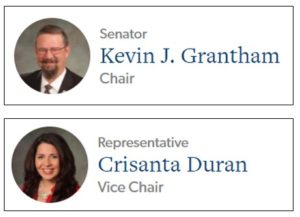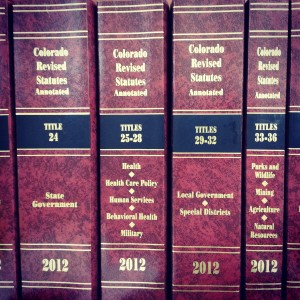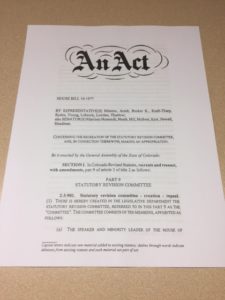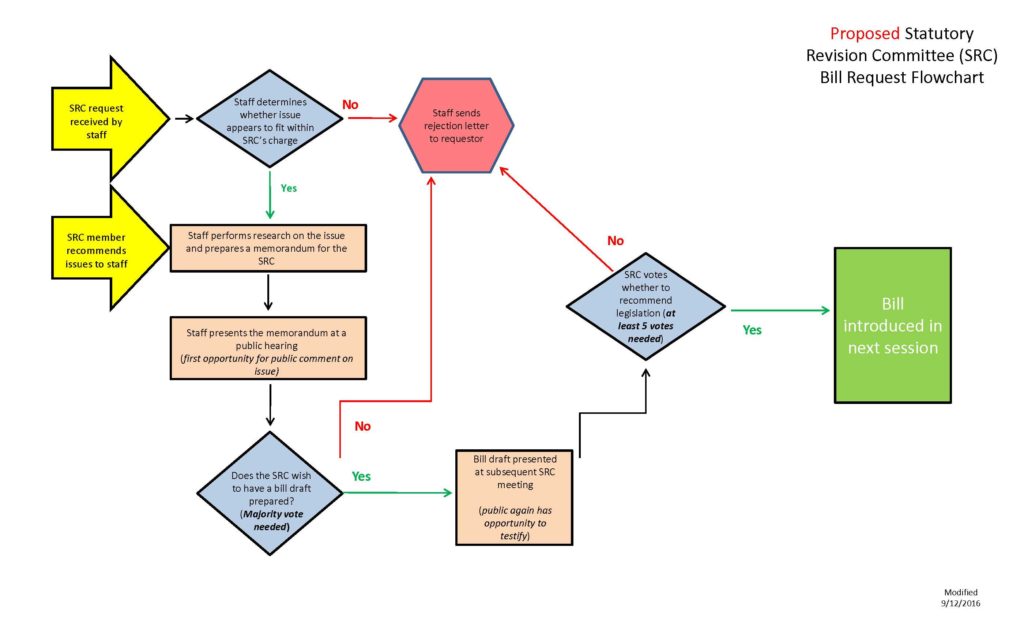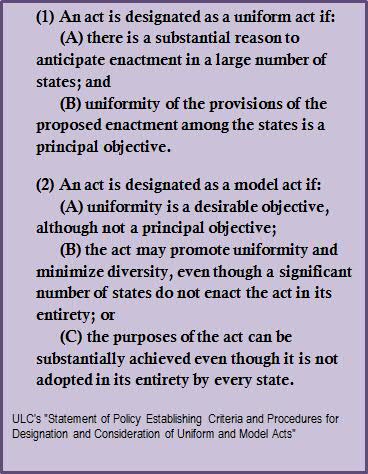by Thomas Morris
Progress Through 2017
In 2016, the General Assembly enacted S.B. 16-163, which directs the Office of Legislative Legal Services (OLLS) to study an organizational recodification of Title 12 of the Colorado Revised Statutes (C.R.S.) governing the regulation of professions and occupations and to bring recommendations, including any legislative proposals to recodify the title, to the Committee on Legal Services (COLS). During the 2017 legislative session, in furtherance of the study recommendations, the General Assembly enacted 14 bills proposed by the COLS to relocate 21 articles to more appropriate titles in the C.R.S. (See the Title 12 Recodification Project’s website for links to these bills). The General Assembly also enacted a bill, H.B. 17-1006, to allow agencies that need to correct statutory citations in the code of Colorado regulations because of these relocations to do so without the notice, comment, and hearing that usually accompany rule making by submitting to the secretary of state a specific, written determination by the attorney general.
During the 2017 interim, the OLLS staff solicited feedback from stakeholders, drafted and distributed numerous relocation bills, and provided the COLS with updates regarding the project’s progress. During the COLS’s December meeting, the OLLS recommended, and the COLS approved, introducing for the 2018 legislative session 10 additional relocation bills. Nine of the relocation bills create a new Title 44 in the C.R.S. to which the bills will move current articles and parts in Titles 12 and 24 that are administered by the Department of Revenue. The tenth relocation bill relocates three articles and one part from Title 12 to other appropriate titles in the C.R.S.
Because of the complexity of the remainder of the project, which entails reorganizing and restructuring the articles administered by the Department of Regulatory Agencies (DoRA) that remain in Title 12 and the need for more stakeholder meetings and in-depth discussions with the department and the regulated community, the OLLS recommended, and the COLS approved, introducing a bill to extend the Title 12 Recodification Project for one additional year.
2018 Regular Session Legislation
Members of the COLS are sponsoring the Title 12 Recodification Project bills in the 2018 legislative session. With the exception of the bill to extend the project, the bills simply relocate a particular set of statutes from one location in the C.R.S. to another location with minor technical updates and do not make any substantive changes to the law. Half of the relocation bills and the project extension bill were introduced in the Senate and the other half of the relocation bills were introduced in the House of Representatives. Here’s a list of the 11 bills introduced so far this session.
| Bill No | Prime Sponsors | Status as of 1/18/18 | Subject | Law Being Relocated |
| SB18-030 | Sens. Holbert & Kagan
Reps. Foote & Willett |
Senate second reading | Motor vehicle dealers | Article 6 of title 12 |
| SB-18-031 | Sen. Gardner;
Rep. Foote |
Senate Appropriations committee | Extends Title 12 Project | |
| SB18-032 | Sens. Gardner & Cooke;
Reps. Foote & Herod |
Senate second reading | Parental notification
Firearms dealers Gun show background checks Unsworn declarations |
Article 37.5 of title 12
Article 26 of title 12 Article 26.1 of title 12 Part 3 of article 55 of title 12 |
| SB18-034 | Sens. Cooke & Guzman
Reps. Wist & Lee |
Senate second reading | Limited gaming
Tribal-state gaming compact |
Article 47.1 of title 12
Article 47.2 of title 12 |
| SB18-035 | Sens. Gardner & Cooke
Rep. Wist |
Senate second reading | Gambling payment intercepts | Part 6 of article 35 of title 24 |
| SB18-036 | Sen. Kagan
Rep. Wist |
Senate second reading | Tobacco sales to minors | Part 5 of article 35 of title 24 |
| HB18-1023 | Rep. Herod
Sen. Gardner |
House Judiciary Committee hearing, 1/23/18 at 1:30 pm | Medical marijuana
Retail marijuana |
Article 43.3 of title 12
Article 43.4 of title 12 |
| HB18-1024 | Rep. Lee
Sen. Kagan |
House Judiciary Committee hearing, 1/23/18 at 1:30 pm | Racing | Article 60 of title 12 |
| HB18-1025 | Rep. Herod
Sens. Gardner & Cooke |
House Judiciary Committee hearing, 1/23/18 at 1:30 pm | Colorado Beer Code
Colorado Liquor Code Special event permits |
Article 46 of title 12
Article 47 of title 12 Article 48 of title 12 |
| HB18-1026 | Rep. Herod
Sens. Gardner & Cooke |
House Judiciary Committee hearing, 1/23/18 at 1:30 pm | Liquor enforcement division cash fund | Part 4 of article 35 of title 24 |
| HB18-1027 | Rep. Wist
Sen. Kagan |
House Judiciary Committee hearing, 1/23/18 at 1:30 pm | Lottery | Part 2 of article 35 of title 24 |
During the stakeholder process that the OLLS conducted during the 2017 interim, some interest was expressed in not only relocating but also reorganizing both the marijuana laws and the laws governing automobile dealers and power sports dealers. Staff have distributed draft bills to accomplish these reorganizations to stakeholders, but there was insufficient time to develop consensus on them before the beginning of the 2018 regular session. The OLLS therefore did not recommend the introduction of these bills to the COLS; if consensus is reached later there is still a possibility that one or both of these bills could be introduced in the 2018 regular session.
So, what’s left?
Actually, the whole point of the project – to reorganize Title 12. If all of the 2018 legislation is enacted, the only laws left in Title 12 will be those administered by DoRA. But they will still be in their preexisting form – with lots of duplicative or nearly duplicative requirements scattered throughout Title 12 and without the benefit of one or more common provisions articles that would apply broadly throughout Title 12. Additionally, there are several laws administered by DoRA relating to professions and occupations that are codified outside of Title 12 (primarily in Title 24) that would benefit from being codified along with the rest of DoRA’s Title 12 authorities.
The plan is for the OLLS to conduct more stakeholder outreach during the 2018 interim, distribute draft reorganization bills, and try to reach consensus on those bills by November. The OLLS would then present its recommendations to the COLS for the introduction of the consensus Title 12 reorganization legislation for the 2019 regular session. Stay tuned!

